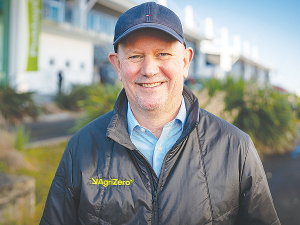AgriZeroNZ invests in methane-reducing tech
A US-based company developing a vaccine to reduce methane emissions in cattle has received another capital injection from New Zealand’s agriculture sector.
 Wayne McNee was initially appointed the JV’s interim executive director to support its establishment after being instrumental in setting up the worldfirst public-private partnership.
Wayne McNee was initially appointed the JV’s interim executive director to support its establishment after being instrumental in setting up the worldfirst public-private partnership.
AgrizeroNZ, the public- private joint venture helping farmers reduce their emissions, has appointed Wayne McNee as its chief executive.
Major agribusiness companies ANZCO, Fonterra, Rabobank, Ravensdown, Silver Fern Farms and Synlait own 50% of AgriZeroNZ, with the other half owned by the Crown through the Ministry for Primary Industries. It was setup to deliver a step-change in investment aimed at accelerating the development and deployment of emissions reduction tools for farmers.
McNee was initially appointed the JV’s interim executive director to support its establishment after being instrumental in setting up the world-first public-private partnership, says Sir Brian Roche KNZM, AgriZeroNZ board chair.
“The board is pleased to appoint Wayne as chief executive to lead the company through its next stage of development, leveraging his deep industry knowledge and relationships across the agricultural sector and the broader market.
“The appointment will provide much needed certainty as we approach the important and challenging task of getting affordable and effective emission reductions tools into farmers’ hands,” said Roche.
McNee says he is excited to take AgriZeroNZ forward beyond its start-up phase and address the critical challenge of reducing emissions from ruminant animals in New Zealand pastoral farming.
“AgriZeroNZ is unique because of the breadth of its sector expertise and commercial focus, along with our collective ambition and advocacy to help farmers reduce their emissions while maintaining profitability.
“We have a great Board and supportive shareholders committed to this long-term partnership, and I look forward to working with them, other funders, the Government, and the companies we are investing in, to get tools into farmers’ hands and deliver on our ambition to reduce agricultural emissions by 30 per cent by 2030.”
McNee says agriculture is the backbone of the New Zealand economy, but global customers of our milk and meat products are setting ambitious greenhouse gas reduction targets which means New Zealand farmers will need to reduce emissions over time.
“AgriZeroNZ is committed to getting farmers the tools they need to meet the targets of our international customers, so they can continue to be the backbone of our economy, help New Zealand achieve its climate goals and lead the way in sustainable pasture-based farming.”
Funding to the JV from agribusiness shareholders is being matched by the Government dollar- for-dollar, to provide around $165 million for the JV’s first four years to 2026.
Since being stood up eight months ago, AgriZeroNZ has made four high-impact investments to bring emissions reduction tools to the market for New Zealand farmers worth over $12 million. Other board members are Jessie Chan, Sir Neville Jordan, Greg Murison, and Fraser Whineray.
The World Wide Sires National All Day Breeds Best Youth Camp Best All Rounder plaudit has become family affair, with 2026 Paramount Cup winner Holly Williams following in her sister Zara's footsteps.
DairyNZ is giving New Zealand farmers a unique opportunity to gain hands-on governance and leadership experience within the dairy sector.
Herd improvement company LIC has posted a 5.2% lift in half-year revenue, thanks to increasing demand for genetics.
According to the latest Fresh Produce Trend Report from United Fresh, 2026 will be a year where fruit and vegetables are shaped by cost pressures, rapid digital adoption, and a renewed focus on wellbeing at home.
The Roar is a highlight of the game hunting calendar in New Zealand, with thousands of hunters set to head for the hills to hunt male stags during March and April.
OPINION: The past few weeks have been tough on farms across the North Island: floods and storms have caused damage and disruption to families and businesses.
OPINION: Fonterra may be on the verge of selling its consumer business in New Zealand, but the co-operative is not…
OPINION: What does the birth rate in China have to do with stock trading? Just ask a2 Milk Company.